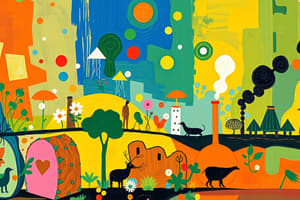Podcast
Questions and Answers
Which of the following components of biodiversity refers to the variety of different species within a given area?
Which of the following components of biodiversity refers to the variety of different species within a given area?
What is one of the main consequences of small population sizes in wildlife?
What is one of the main consequences of small population sizes in wildlife?
Which process is primarily responsible for causing algal blooms in aquatic environments?
Which process is primarily responsible for causing algal blooms in aquatic environments?
From where does phosphorus primarily originate in the ecosystem?
From where does phosphorus primarily originate in the ecosystem?
Signup and view all the answers
What characteristic is true for the major greenhouse gases in terms of their environmental impact?
What characteristic is true for the major greenhouse gases in terms of their environmental impact?
Signup and view all the answers
What is the primary consequence of CO2 absorption in the oceans?
What is the primary consequence of CO2 absorption in the oceans?
Signup and view all the answers
What does the concept of Maximum Sustained Yield (MSY) refer to?
What does the concept of Maximum Sustained Yield (MSY) refer to?
Signup and view all the answers
What is a key factor contributing to coral reef decline?
What is a key factor contributing to coral reef decline?
Signup and view all the answers
Which of the following is a driver of biodiversity loss?
Which of the following is a driver of biodiversity loss?
Signup and view all the answers
How does the shifting baseline phenomenon affect ecosystem assessment?
How does the shifting baseline phenomenon affect ecosystem assessment?
Signup and view all the answers
What is the primary source of greenhouse gas emissions in food production?
What is the primary source of greenhouse gas emissions in food production?
Signup and view all the answers
What is the benefit of reducing food waste?
What is the benefit of reducing food waste?
Signup and view all the answers
Which method combines various techniques to manage pests sustainably?
Which method combines various techniques to manage pests sustainably?
Signup and view all the answers
What defines the economic injury level in pest management?
What defines the economic injury level in pest management?
Signup and view all the answers
What role do keystone species play in an ecosystem?
What role do keystone species play in an ecosystem?
Signup and view all the answers
What does re-wilding primarily involve?
What does re-wilding primarily involve?
Signup and view all the answers
What is a significant environmental cost associated with beef production?
What is a significant environmental cost associated with beef production?
Signup and view all the answers
What distinguishes in-situ from ex-situ conservation?
What distinguishes in-situ from ex-situ conservation?
Signup and view all the answers
Which of the species attributes below is NOT associated with greater extinction risk?
Which of the species attributes below is NOT associated with greater extinction risk?
Signup and view all the answers
Adaptation to climate change by a species requires:
Adaptation to climate change by a species requires:
Signup and view all the answers
What is NOT an example of a regulation that prevents the tragedy of the commons?
What is NOT an example of a regulation that prevents the tragedy of the commons?
Signup and view all the answers
If we could scale up carbon capture globally, which environmental woe is believed to be the most irreversible on large scales in the near term?
If we could scale up carbon capture globally, which environmental woe is believed to be the most irreversible on large scales in the near term?
Signup and view all the answers
Which of the following provides the most opportunities for sustainably feeding the world?
Which of the following provides the most opportunities for sustainably feeding the world?
Signup and view all the answers
Integrated Pest Management refers to a system of crop management where:
Integrated Pest Management refers to a system of crop management where:
Signup and view all the answers
The most extreme temperature changes caused by global warming will be felt:
The most extreme temperature changes caused by global warming will be felt:
Signup and view all the answers
Which of the following elements of food production makes the largest contribution to greenhouse gas emissions?
Which of the following elements of food production makes the largest contribution to greenhouse gas emissions?
Signup and view all the answers
Study Notes
Global Change Ecology Exam Study Guide
- Exam Format: Multiple choice, approximately 80-85 questions. No short answer questions.
- Content Focus: Primarily from PowerPoint slides (lectures 1-11 and since midterm), readings, quizzes, previous exams, and visitor presentations.
- Emphasis: First 4 course lectures and 7 lectures since the midterm. Graphs and images from PowerPoints, especially those crucial for understanding. Some recent "in the news" or student-presented slides will not be on the exam.
-
Key Lecture Concepts:
- Biodiversity: Four components (genetic, species, ecosystem, and functional).
- Population Size Importance: Small populations at greater risk of inbreeding, diversity loss, and extinction.
- Eutrophication: Nutrient runoff (nitrogen, phosphorus) causing algal blooms and oxygen depletion.
- Nutrient Cycles: Nitrogen fixation and phosphorus cycling from atmosphere and rock weathering, essential to organisms and ecosystems.
- Greenhouse Gases: CO2, CH4, N2O, and H2O vapor, properties, relative abundance, and warming potential.
- Ozone Layer Function: Blocks harmful UV radiation.
- Biodiversity Loss Drivers: Habitat loss, overexploitation, pollution, invasive species, and climate change.
- Coral Reef Decline: Bleaching from warming oceans, acidification, and pollution.
- Ocean Acidification: CO2 absorption lowers pH, harms marine life.
- Sustainable Harvesting: Practices to prevent depletion.
- Maximum Sustainable Yield (MSY): Largest sustainable yield a resource can provide.
- Tragedy of the Commons: Overuse of shared resources.
- Ecosystems: Impacts of exotic/invasive species, biotic homogenization, and strategies for increasing crop yields.
- Food Production: Dietary transitions, greenhouse gas emissions from different aspects (food production, storage, transport, and waste reduction), methods for minimizing pest damage.
- Climate Change and Global Warming: Extreme temperature changes and impacts on different ecosystems like polar regions.
- Ecological Catastrophe: Possible impact caused by exceeding boundary limits.
- Biodiversity Loss Drivers: Major drivers of mass extinctions- (meteor strikes, marine anoxia, ecological dominance of a single species, periods of elevated CO2 levels, and periods of elevated volcanic activity).
- Keystone Species: Crucial to ecosystem function.
- Conservation Techniques: Re-wilding, in-situ and ex-situ conservation.
- People in Study Guide: Greta Thunberg, Elizabeth Kolbert, Gene Likens, Margaret Meade, James Porter, Doug Tallamy.
- Readings and Videos to Review: Several videos and readings, including "Death by a Thousand Cuts" (Wagner) and "Greenland" (Kolbert).
- Important Videos/Readings Links: Provided.
Studying That Suits You
Use AI to generate personalized quizzes and flashcards to suit your learning preferences.
Related Documents
Description
Prepare for your Global Change Ecology exam with this comprehensive study guide. Focused on key concepts from lectures and readings, the guide includes multiple-choice questions that cover essential topics like biodiversity, population dynamics, and nutrient cycles. Review visual materials that are crucial for understanding course content and boost your exam readiness.



